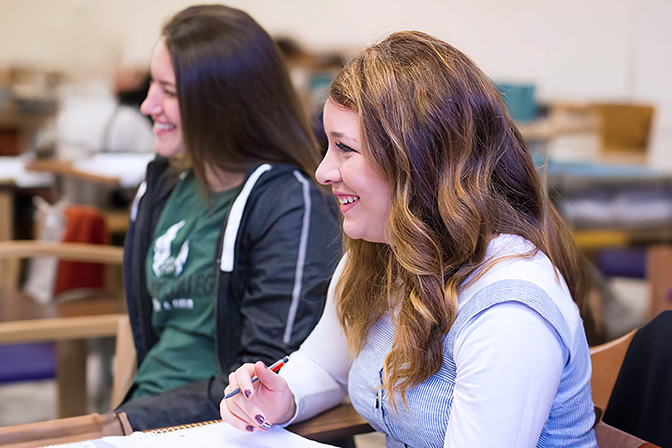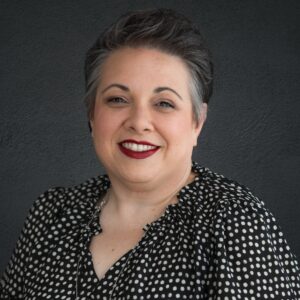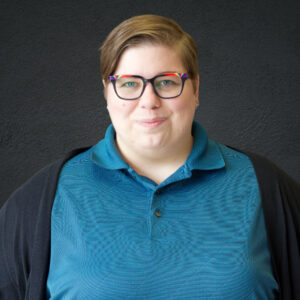Education
<RETURN TO ALL PROGRAMS
Education Overview & Goals
The Teacher Preparation Program provides certification candidates with professional preparation through early hands-on learning experiences, small class sizes, and caring faculty. Candidates integrate a liberal arts background, content preparation, and educational principles to prepare for careers in teaching at the elementary and secondary school levels or in an interdisciplinary synthesis of Psychology and Education.
Prior to graduation teacher candidates will have completed approximately 650 hours in a classroom giving them the opportunity to apply techniques and practices in an educational setting. Candidates also are given opportunities to expand on the benefits of being global citizens who benefit and appreciate multi-cultural experiences.
The Department of Education offers majors in Elementary Education Grades K-6, and an Interdisciplinary major in Psychology and Education. Minors are available in Multi-categorical Special Education with Autism PreK-K, K-6 or 5-Adult and Secondary Education (Art, Biology, Chemistry, English, Mathematics, Physical Education, Social Studies, and Spanish). Additionally, an Endorsement in Reading is offered.
Bethany College is a member in good standing of the Association for Advancing Quality in Educator Preparation (AAQEP). Bethany College is working toward accreditation of its educator preparation programs under the AAQEP standards with an anticipated Quality Assurance Review in Fall 2022.
Program Goals
As reflective practitioners within the realms of a liberal arts education and professional studies program our graduates will be able to:
Apply in their vocational setting, current research-based pedagogical techniques and practice
- Evaluate formative and summative assessments as a means to differentiate instruction in order to meet the needs of a diverse population of learners
- Develop a unique and relevant personal and professional philosophy of education
- Take their places as 21st Century instructional leaders who guide learners to the highest possible levels of critical thinking, ethical, and moral development
- Become active members of national or international professional organizations and support cultural and community enriching endeavors
- Be global citizens who benefit from and appreciate multi-cultural experiences
- Exhibit exemplary professional behavior and demonstrate a high degree of self-efficacy.

Areas Of Study
Multi-Category Special Education K-Adult (Minor)
ALUMNISUCCESS
CAREERS IN EDUCATION
- Pre-school
- Elementary
- Middle
- Secondary
Administration K-12
- Principal
- Superintendent
- Reading
- Title 1
- Guidance Counseling
- School Psychology
- School Social Work
- Occupational Therapy
- Physical Therapy
- Audiology and Speech Pathology
- Library/Information Services
- Special Education
- Career/Technical Education
- Self-Enrichment
- English as a Second Language
- Curriculum Supervision
- Subject Area Supervision
Test Preparation
Meet The Faculty
PROGRAM HIGHLIGHTS
CLUBS & ORGANIZATIONS
From Science Day in the fall to Fun Day, with special needs students with disabilities, in the spring, these clubs offer tremendous opportunities for personal growth.In addition to sponsoring professional development conferences on campus, these clubs travel extensively to state, national, and international conferences.
PE Club
The Physical Education (PE) Club is a club geared toward PE majors in the teaching education and sports management tracks. This club provides professional development for education majors and minors across all content areas. Particular emphasis is given to participation in state and national conferences.
SNEA
The Student National Education Association (SNEA) allows students the opportunity to become members in a professional organization committed to advancing and strengthening public education.
Bethany’s chapter focuses on community service and professional development opportunities for students and area teachers. Bethany’s chapter of SNEA is a part of a network of chapters within the state of West Virginia.
Science Day – During the fall semester, SNEA partners with the Brooke County PTA to sponsor Science Day on campus.This event allows area elementary students in grades 3-6 to attend Bethany’s campus and conduct hands-on science experiments with Bethany College students.
Program Student Enrollment30
EDUCATION DEPARTMENT QUICK FACTS
Minimum GPA Required for Admission into the Teacher Education Program: 2.5
Minimum GPA of Individuals Completing the Program: 2.5
Program Completers: 5
Test Scores: Praxis Pass Rates for All Completers: 85%
REQUIREMENTS EDUCATION MAJOR
Elementary Education (K-6): EDUC 203, 242, 282, 295, 346, 348, 351, 352, 353, 445, 470, 471, 472, 473, 490, 495; FINA 125, MATH 103 (or higher), MATH 250, MATH 252; RDNG 215, 347; SOCI 210; SPED 207, 208; PSYC 100 or 315.
In addition, only those students who have completed the following courses are eligible for Elementary K-6 Certification: BIOL 100 (or higher); CHEM 100 (or higher) or PHYS 103 (or higher); GENS 202; HIST 201 or 202, 225; POLS 225.
Note: Successful completion of PRAXIS I Core Academic Skills for Educators (Reading, Writing, and Math) with passing West Virginia scores must occur before enrolling in any 300-level or higher course in Education, Special Education, or Reading.
Note: Additional courses are required to complete a Minor in Multi-categorical Special Education with Autism, as well as Endorsement in Reading. A Content Portfolio and a Professional Portfolio are also required as part of the Education program.
Middle Childhood Education (5-9)*: EDUC 203, 242, 282, 295, 348, 351, 352, 426, 427, 445, 470, 471, 472, 473, 490, 495; RDNG 376; SOCI 210; SPED 207, 208; PSYC 100.
Note: Candidates interested in grades 5-9 certification only must complete the Middle Childhood Education 5-9 program in two fields selected from English, General Science, Mathematics, Physical Education (PHED 333 may be substituted for SPED 208), Social Studies, or Spanish.
REQUIREMENTS MULTI-CATEGORICAL SPECIAL EDUCATION K-6 OR 5-ADULT MINOR
Multi-categorical Special Education K-6 or 5-Adult: Learning Disabilities, Mental Impairments, and Behavior Disorders: SPED 207, 208, 320, 330, 450, 470 or 471; PSYC 315. As a minor, Special Education may be completed by Secondary Education candidates, but the Special Education multi-categorical with Autism certification may only be added to English, Mathematics, Science, or Social Studies certification. Elementary Education candidates may also complete a sequence of courses in English, Mathematics, Science, or Social Studies for Restricted Content Special Education Certification in 5-Adult.
Multi-categorical Special Education PreK-K with Autism Endorsement: SPED 207, 208, 212/512, 312/612, 320, 330, 450, 470; EQUI 305 or SPED 310. PreK-PreK must also complete: EDUC 204/504, RDGN 354/545; SPED 340/540. Secondary majors must also complete: EDUC 346 and MATH 250. The PreK-K Multi-categorical with Autism Endorsement may be added only to Elementary Education and Secondary English, Mathematics, Science, or Social Studies certification.
REQUIREMENTS SECONDARY EDUCATION MINOR
REQUIREMENTS READING ENDORSEMENT
Reading Elementary Education (K-6)
*EDUC 346/646 Foundations of Literacy 3 credits
*EDUC 351 Language Arts and Social Studies Methods 3 credits
*RDNG 215 Adolescent and Children’s Literature 3 credits
*RDNG 347/647 Reading Assessment and Instruction 3 credits
RDNG 376/676 Content Area Literacy 3 credits
RDNG 422/622 Reading Clinic 3 credits
*Courses already required for elementary education certification. Students must also complete the remaining coursework and other requirements for K-6 certification.
Reading Middle Childhood (5-9) and Secondary (5-Adult)
EDUC 346/646 Foundations of Literacy 3 credits
*EDUC 351 Language Arts and Social Studies 3 credits
RDNG 215 Adolescent and Children’s Literature 3 credits
RDNG 347/647 Reading Assessment and Instruction 3 credits
*RDNG 376/676 Content Area Literacy 3 credits
RDNG 422/622 Reading Clinic 3 credits
*Courses already required for middle childhood education certification. Students must also complete the remaining coursework and other requirements for the 5-9 or 5-Adult certification areas including:
• Biology 9-Adult
• Chemistry 9-Adult
• General Science 5-9
• English 5-9, 5-Adult
• Mathematics 5-9, 5-Adult
• Physical Education 5-9, 5-Adult
• Social Studies 5-9, 5-Adult
• Spanish 5-9, 5-Adult
Additional information on these programs can be obtained from the department.
COURSE DESCRIPTIONS EDUCATION
EDUC 100 Strategies for Effective Tutoring 2 credits
This course is a preparatory course for those students interested in becoming tutors for the McCann Learning Center. A variety of effective instructional strategies will be demonstrated and practiced.
EDUC 105 Praxis Preparation 1 credit
Praxis Preparation, a required course, provides a review of the content and strategies for the West Virginia mandated Praxis tests. Students will complete sample tests and be provided feedback on their strengths and weaknesses. The course will include strategies for reducing test anxiety and test-taking strategies specific to the Praxis. Any student whose SAT or ACT scores qualify them for a Praxis wavier will not be required to take the course.
EDUC 203 Human Development 3 credits
This course is a study of human development from infancy through death. The course applies learning theory to life-span development to promote self-understanding and to provide preparation for working with individuals, families, groups, and communities. Must receive a grade of B- or better in order to take EDUC 242.
EDUC 242 Professional Principles 3 credits
This course explores the goals of education and their implementation, the role of the teacher, and the concerns of professional educators and applies the concepts of human development to student learning outcomes. A history of education component is included. A field experience is required. Prerequisite: EDUC 105 and 203, with a grade of B- or better or permission of the Chair.
EDUC 282 Instructional Technology 3 credits
This course examines the role of technology instruction, specifically addressing education technology standards for teachers. The course prepares pre-service teachers to integrate technology into instruction in a meaningful manner. Prerequisite: EDUC 242.
EDUC 295 Multicultural Field Experience Non-Credit
Candidates for certification complete a 20-hour early field experience in a school setting that is multiculturally different from the schools they have attended. This experience is selected and arranged by the candidates themselves, pending department approval. Specified documentation of the experience by the candidates is evaluated by department faculty to ensure that candidates demonstrate the capacity to interact with students from differing ethnic, racial, gender, socioeconomic, language, and religious groups. The experiences help prepare candidates to confront issues of diversity that affect teaching and student learning and to develop strategies for improving student learning and promoting the candidates’ effectiveness as teachers.
EDUC 346 Foundations of Literacy and Language Systems 3 credits
This course focuses on the beginnings of the development of literacy in children including the fundamentals of reading and writing as processes and how children come to understand and use those processes in differing settings. Research-based instructional strategies for supporting the development of children’s literacy are explored, including alphabet and print awareness, phonological awareness, phonics, fluency, vocabulary and comprehension. A 10-hour field placement is required. (This course may be taken for credit as EDUC 646.) Prerequisite: EDUC 242; a passing score on PRAXIS I Core Academic Skills for Educators; admission to teacher education program or enrolled as a non-degree seeking student.
EDUC 348 Classroom Discipline and Instruction 3 credits
This is an intensive and unit-focused course covering student assessment, discipline models, and classroom management strategies, as well as instructional planning, effective teaching strategies, and professional development. Primary emphasis is on the refinement of teaching techniques and the continued development of the teacher as reflective practitioner model. A required field placement provides the opportunity for reflection and the application of theory to practice. Prerequisites: EDUC 242; a passing score on PRAXIS I Core Academic Skills for Educators; admission to teacher education program.
EDUC 351 Integrated Methods in the Elementary School: Language Arts and Social Studies 3 credits
This course provides students an opportunity to apply the methods and strategies appropriate for teaching Language Arts and Social Studies in the elementary classroom. Students will explore literature appropriate for the social studies classroom, elementary writing programs, writing assessment, and instructional techniques for the integration of the Language Arts with Social Studies. A 15-hour field placement is required. Prerequisite: EDUC 242; a passing score on PRAXIS I Core Academic Skills for Educators; admission to teacher education program.
EDUC 352 Integrated Methods in the Elementary School: Mathematics and Science 3 credits
This course is a practical application of the concepts of math and science presented in the elementary school curriculum. Emphasized are the understanding of fundamental processes and practical application. A 15-hour field placement is required. Prerequisite: EDUC 242; a passing score on PRAXIS I Core Academic Skills for Educators; admission to teacher education program.
EDUC 353 Integrated Methods in the Elementary School: Health and Physical Education 3 credits
This course is an examination of the methods and activities appropriate for teaching health and physical education in the elementary school. A 10-hour field placement is required. Prerequisite: EDUC 242; a passing score on PRAXIS I Core Academic Skills for Educators; admission to teacher education program.
EDUC 426 Principles and Techniques of Middle School Education 2 credits
This course is an examination of the teaching concepts and skills unique to the middle school teacher. Focus is on the middle school child in relation to the developmental changes that occur during the adolescent years, including psychological, physical, and social changes. Teaching strategies and methods appropriate for the adolescent learner are developed. A 15-hour field placement is required. Prerequisite: EDUC 242; a passing score on PRAXIS I Core Academic Skills for Educators; admission to teacher education program.
EDUC 427 Middle School Curriculum and Organization 1 credit
This course is an examination of the instructional organization and curriculum designs of the middle level school and classroom. Emphasis is on the evaluation and implementation of middle level curriculum. Various programs germane to the middle level program, including teacher-based guidance and interdisciplinary teaming, are addressed. A 15-hour field placement is required. Prerequisite: EDUC 242; a passing score on PRAXIS I Core Academic Skills for Educators; admission to teacher education program.
EDUC 445 Professional Issues in Education 4 credits
This course provides opportunities for student teachers to develop their reading, writing, listening, speaking, and multimedia presentation skills. Prerequisite: Continuation in teacher education.
EDUC 470 Clinical Practice and Student Teaching I 4 credits
This course is a directed and supervised first placement of a two-placement semester-long student teaching experience in schools with partial assignments at appropriate grade levels. Candidates must make application for student teaching prior to advance registration. Other courses and activities which might interfere with student teaching are not permitted. Success in this experience is required for continuing in the education program; failure results in removal from student teaching and from the education program. (CR/NCR only). Corequisite: concurrent enrollment with EDUC 472.
EDUC 471 Clinical Practice and Student Teaching II 4 credits
This course is a directed and supervised second placement of a two-placement semester-long student teaching experience in schools with partial assignments at appropriate grade levels. Candidates must make application for student teaching prior to advance registration. Other courses and activities which might interfere with student teaching are not permitted. Success in this experience is required for continuing in the education program; failure results in removal from the education program. (CR/NCR only).Corequisite: concurrent enrollment with EDUC 472.
EDUC 472 Student Teaching Seminar 2 credits
This course is an integrative seminar for the student teaching experience. Students meet in assigned groups for collaborative experiences and assessment. Students engage in the preparation of their final assessment portfolios. This course is part of the Education Block. (CR/NCR only.) Prerequisite: admission to the Professional Block.
EDUC 473 Philosophy of Education 2 credits
This course develops knowledge and skills necessary to accomplish the following outcomes: research; critically examine and determine one’s own philosophy of education; and, construct and reflect upon a set of academic artifacts which exemplify preparation for classroom teaching according to national standards established by the West Virginia Professional Teaching Standards and the Council for Accreditation of Educator Preparation.
EDUC 480 Methods and Materials in Teaching 3 credits
See courses numbered 480 offered in Chemistry, English, General Sciences, Mathematics, Physical Education, Physics, Psychology, Social Science, Visual Art, and World Languages and Cultures. A 30-hour field placement is required. Prerequisites: EDUC 242; a passing score on PRAXIS I Core Academic Skills for Educators; admission to teacher education program.
EDUC 484 Methods of Teaching English as a World Language: Selected Methodological Issues 3 credits
This course is a study of the methods and materials necessary for teaching English as a second language and provides instruction and practice in planning lessons and extracurricular activities. (This course may be taken for credit as WLAC 484 or ENGL 484.)
EDUC 487-488 Independent Study 1-4 credits
EDUC 490 Senior Project 2-4 credits
EDUC 495 Comprehensive Exams
This course is an administrative placeholder used to record a student’s score on Comprehensive Exams (CR/NCR).
COURSE DESCRIPTIONS SPECIAL EDUCATION
SPED 207 Exceptionalities and Diversities 3 credits
This course introduces students to the various exceptionalities and diversities found in general and special education classrooms. Students examine characteristics of exceptional learners, appropriate accommodations and modifications, assistive technology, the continuum of services, and the consultation and collaborative models of instruction. Special emphasis is given to a cultural perspective on learning within the general classroom environment. A 10-hour field placement is required. Prerequisite: EDUC 203 and 242 or permission of the Chair.
SPED 208 The Special Education Process 3 credits
This course examines the history of special education and the resulting special education process. Students actively participate in the referral process for special education, creating individualized education and transition plans through a variety of class activities and simulations. Special emphasis is on the role of the family system in the special education process, due process rights and responsibilities, theories in special education, and current legislation and litigation. Students are also introduced to specialized curriculum options in special education. A 20-hour field placement is required. Prerequisite: SPED 207.
SPED 212 Autism I: Characteristics and Instruction 3 credits
This course provides an intensive look at the characteristics, identification, and instructional service delivery systems available for students with autism, Asperger’s Syndrome, and other developmental delays. Specific instructional program features and the various origins and interventions of autism are emphasized. (This course may be taken for credit as SPED 512.)
SPED 312 Autism II: Teaching Internship and Advanced Research 3 credits
This course provides an opportunity for students to work in the field with students with autism. Special emphasis is on the implementation of research-validated teaching strategies, community-based instruction, home planning, and data collection and analysis. Current and controversial research in the field of autism is also examined and debated. A 30-hour field placement is required. (This course may be taken for credit as SPED 612.) Prerequisites: SPED 207 and SPED 212 or SPED 512; a passing score on PRAXIS I Core Academic Skills for Educators; admission to teacher education program or enrolled as a non-degree seeking student.
SPED 320 Assessment and Methods in Special Education I 2 credits
This course is the first of two on assessments and methods in special education. Students are introduced to a variety of types of formal and informal assessments related to reading, spelling, and written language. Students gain proficiency in administering, scoring, and interpreting standardized tests used in the identification and evaluation of students in special education. Students create written assessment reports with interventions and various forms of curriculum-based assessments. Special emphasis is on the practice and creation of materials appropriate for the areas of fluency, reading comprehension, decoding, strategy instruction, spelling, and written language. A 10-hour field placement is required. Prerequisites: SPED 207; a passing score on PRAXIS I Core Academic Skills for Educators; admission to teacher education program.
SPED 330 Assessment and Methods in Special Education II 2 credits
This course is a continuation of Assessments and Methods in Special Education I. Students conduct formal and informal assessments in the areas of mathematics, social skills, and behavior. Functional behavior assessments and behavior intervention plans are created and specific curricula are examined and practiced. Special emphasis is on the functional life skills curriculum and on school-to-work initiatives. A 20-hour field placement is required. Prerequisite: SPED 207; SPED 320; a passing score on PRAXIS I Core Academic Skills for Educators; admission to teacher education program.
SPED 450 Current Issues and Trends in Special Education 2 credits
This course is an examination of the current issues and trends in the field of special education. A variety of legal, ethical, social, and vocational issues are reviewed, analyzed, and discussed. In addition, students reflect on their varied experiences in special education and create a personal philosophy of special education. Prerequisites: SPED 320 and SPED 330; a passing score on PRAXIS I Core Academic Skills for Educators; admission to teacher education program.
SPED 470 Clinical Practice and Student Teaching: Special Education I 4 credits
This course is a directed half-semester observation and student teaching experience in schools, with partial assignments in appropriate areas of special education. Students must have applied for student teaching prior to registering for this course. Other courses or activities which might interfere with student teaching are not permitted. (CR/NCR only). Corequisite: concurrent enrollment with EDUC 472.
SPED 471 Clinical Practice and Student Teaching: Special Education II 4 credits
This course is the directed and supervised second placement of a two-placement semester long student teaching experience in schools with partial assignments at appropriate grade levels. Candidates must make application for student teaching prior to advance registration. Other courses and activities which might interfere with student teaching are not permitted. Success in this experience is required for continuing in the education program; failure results in removal the from education program. (CR/NCR only). Corequisite: concurrent enrollment with EDUC 472.
SPED 475 Professional Internship 4 credits
This course provides for participation in an educational program appropriate to the student’s area of study and potential employment. Students apply the skills and knowledge gained in the designated program to the selected internship experience.
SPED 487-488 Independent Study
COURSE DESCRIPTIONS READING
RDNG 215 Adolescent and Children’s Literature 3 credits
This course focuses on extensive reading of diverse genres of literature written for children and adolescents and use of literature across the K-12 curriculum. Students will use a variety of methods to reflect on and respond to literature, learn about prominent authors and illustrators, and consider the historical aspects of children’s literature in society and cultures. A major focus will be on learning how to encourage children to become motivated and engaged readers.
RDNG 347 Reading Assessment and Instruction 3 credits
During this course, students conduct a comprehensive examination of research-based reading assessment tools. Students use both informal and formal reading assessments to plan and implement data-based instruction and plan for reading interventions. Scientifically-based reading intervention and effective reading program components will be modeled and practiced. A 10-hour field placement is required. Prerequisite: EDUC 346; a passing score on PRAXIS I Core Academic Skills for Educators; admission to teacher education program or enrolled as a non-degree seeking student.
RDNG 376 Content Area Literacy 3 credits
This course explores the use of research based literacy activities in all areas of study. Because of the diverse nature of this class, students create their own portfolio of literacy resources and activities relevant to their particular subject area and grade level. A 10-hour field placement is required. Prerequisites: A passing score on PRAXIS I Core Academic Skills for Educators; admission to teacher education program or enrolled as a non-degree seeking student.
RDNG 422 Reading Clinic 4 credits
This is a laboratory course which focuses on methods that can be used by classroom teachers, reading specialists, and other special teachers of reading and language arts. The major emphasis of this course is an extensive and supervised tutoring internship with children who have reading difficulties. A 30-hour field placement is required. Prerequisites: EDUC 346; RDNG 347; a passing score on PRAXIS I Core Academic Skills for Educators; admission to teacher education program or enrolled as a non-degree seeking student.






Info
Visit
Apply
Deposit